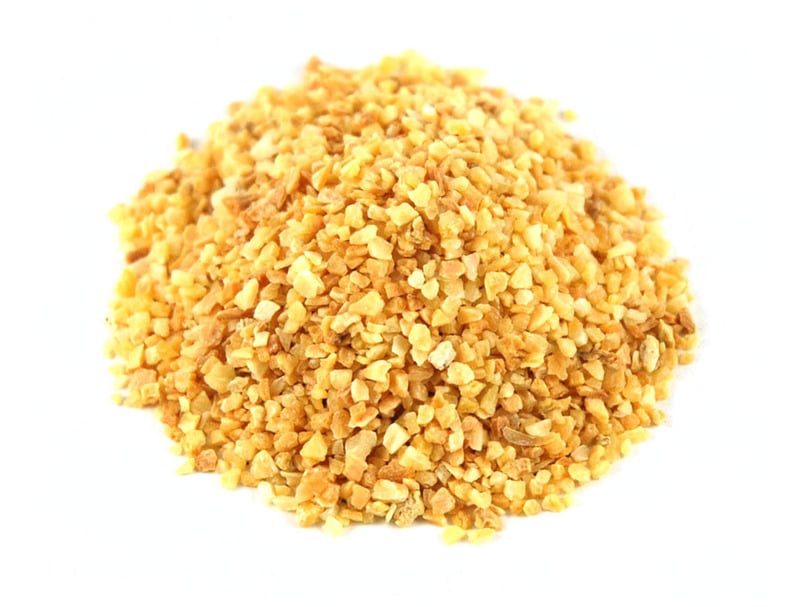Dehydrated Garlic Allium Sativum in bulk packaging
Login to view prices
Common name: Garlic
Latin name: Allium sativum L.
Family: Liliaceae
Other names: Engl.: garlic, English garlic, poor man's treacle. Deu.: Knoblauch, Alterswurzel, Knobloch, Knofel, Stinkerzwiebel. Suom.: valkosipuli. Sven.: vitlök. Fran.: ail, ail blanc, ail cultivé. Span.: ajo.
Botanical Origin:
Common name: Garlic
Latin name: Allium sativum L.
Family: Liliaceae
Other names: Engl.: garlic, English garlic, poor man’s treacle. Deu.: Knoblauch, Alterswurzel, Knobloch, Knofel, Stinkerzwiebel. Suom.: valkosipuli. Sven.: vitlök. Fran.: ail, ail blanc, ail cultivé. Span.: ajo.
Description:
Garlic is an annual that can grow 2 feet high or more.
The Garlic plant have 6-12 long, narrow and flat like grass leaves. The leaves of garlic are erect, narrow, flat and bladelike, with a crease down the middle. The most important part of this plant for medicinal purposes is the bulb (subterranean reserve structure derived from a leaf).
The bulb consists of numerous bulblets, known as ‘cloves’ held between the papery membrane and enclosed within a whitish skin as a sac. Each bulb is made up of 4 to 20 cloves, and each clove weighs about 1 gram and with at least one flat side.
The flowers rise from a single central stem direct from the bulb and are white in color.
Range & Habitat:
Original habitat is obscure. Austria; Britain; Bulgaria; Canada; China; Cuba; Dominican Republic; Egypt; France; Haiti; India; Iraq; Kurdistan; Malaya; Mexico; Pakistan; Panama; Paraguay; Puerto Rico; Russia; South Africa; Spain; Trinidad; Turkey; USA; Venezuela
Egypt has been a major producer during the past two decades.
Garlic prefers a sunny position in a moist, light, well-drained soil with a pH of 4.5 to 8.3. It can tolerate periods without rain, but best results come from plants that receive regular watering. The site selected for planting garlic must have excellent drainage and adequate sunlight.
Planting & Cultivation:
Garlic never produces fertile seeds and must be propagated by dividing the bulbs into individual cloves carefully and planting each clove as a set. It is grown as an annual and planted from September through February.
Condition the soil with lots of organic matter, bone meal etc one or two weeks before planting. Add more sand if the soil is clayish. Individual Cloves can be planted 2-3 inches deep with their noses just below the soil surface and 4-6 inches apart. Damaged cloves should not be planted to avoid diseases or pests.
Harvesting and Preparing for the Market:
Harvest is usually sometime from mid-July through August, about nine months after planting depending upon conditions and the type of garlic. Bulbs should be dug-up when 2-3 leaves turn brown. Be careful not to bruise or injure the bulbs, dig carefully beside the plant and then underneath it with a spading fork to loosen the plant, lift the bulb up and gently remove excess dirt.
Garlic with the entire bulb and stalk, must be well dried and cured after harvest, before being stored. Tie the garlic stalks together about a dozen in a bundle, and hang them up to be dried for two to three weeks in an airy well-ventilated location not under direct sunlight. Once dry, the roots should be trimmed off and the stalk removed about an inch from the head. Bulbs store best with good air circulation on all sides. Bulbs to be saved for later planting can be stored in a plastic bag in the refrigerator for up to 8 months. Fresh garlic is best stored in an open container in a cool, dark place. Bulbs should be able to keep for eight weeks at a time – whereas if you break the cloves off individually, they will begin to dry after about three days
Yield:
One acre yields from 7.2 to 8.5 tons in average.
==========================
Export Markets:
We export our products to many countries all over the world. USA, France, Germany, China, Malaysia, Algeria, Morocco, Indonesia…etc
Quotation:
- Incoterms: FOB
- Quantity: one 20″ FCL Container Minimum
- Specification: 100% natural and Pure quality
- Documentation: COA, MSDS, TDS, GC Peaks
- Packaging: Bulk Packaging
- Payment terms: TT in advance to Our bank account
- Lead time: Shipping through 10 days from receipt of the payment.
- Sea Shipping Time: 35 days
- Air shipping time: 10 days
Quality Certificates:
- ISO 9001-2015
- ISO 22000-2005
- GMP accredited by AQC Middle East FZE
- KOSHER Certificate
- Halal Certificate
- ORGANIC Certificate accredited by CERES GmbH Germany
- NOP Certificate accredited by CERES GmbH Germany
- Egyptian Ministry of Health Permission
Contact us please to receive other supporting documents for our Oils :
- COA
- MSDS
- TDS
Branding Services
We also can do customized packaging for you to pack whatever size you like. We can help in designing labels, selecting good packets or bags. We deliver integrated solutions under your brand..
Organically Certified product Available upon request
Additional information
| Weight | 8000 kg |
|---|---|
| Dimensions | 610 × 244 × 259 cm |
| Country of Origin | India, Egypt |
| Ship from | Egypt, India |
| Dehydrated Forms | Choped, Granules, Flakes, Powder, Minced, Pieces |
| 20 Container Capacity H | 18000 kg, 14000 kg, 12000 kg |
| Herbs Packaging | PE bags 25 Kg, PE Bags 50 kg, Paper Bag 25 kg, Paper Bag 50 kg |
| Cultivation Type | Organic, Conventional |
| HS Code | 09109990 |
| Custom Branding & Packaging | Yes, OEM Custom banding, designing and packaging are available for that product |
| Herbal OEM Packaging | Kraft Bag, Kraft Bag with transparent window, Kraft bag with open side, Glass Jar, Glass jar Spices with holed lid, Tin Packaging |
| Documentation & Certifications | Allergen Free Certificate, Bovine Spongiform Encephalophathy (BSE) Certificate, GMO Certificate, GRAS Status Statement, Herbal Origin Statement, Organic Certificate, Pesticide Residual Certificate, Halal Certificate, KOSHER Certificate, Researches & Studies, Certificate of Analysis (COA), Technical Data Sheet (TDS) |
-
Login to view prices
Dehydrated Bell Sweet Pepper Paprika Capsicum annuum in bulk packaging
Login to view prices Read more -
Login to view prices
Calendula officinalis Marigold Flowers in Carton Shipped in 20″ FCL Container
Login to view prices Read more -
Login to view prices







